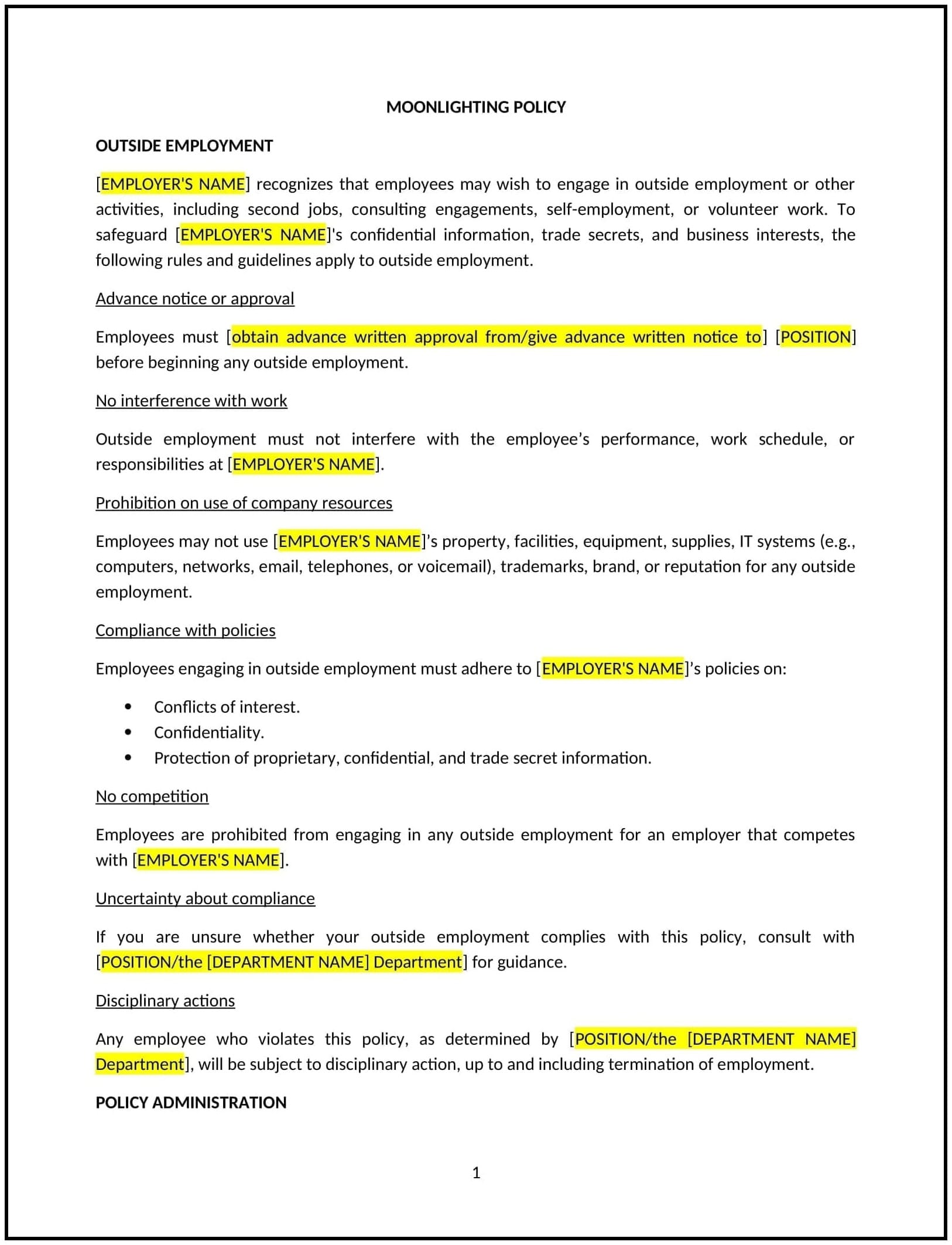Got contracts to review? While you're here for policies, let Cobrief make contract review effortless—start your free review now.

Customize this template for free
Moonlighting policy (Nebraska)
A moonlighting policy helps Nebraska businesses set clear guidelines for employees who wish to take on additional work outside of their primary job. This policy outlines the company’s expectations regarding secondary employment, ensuring that employees’ outside work does not conflict with their responsibilities, interfere with company operations, or present a conflict of interest. It helps businesses maintain focus, prevent distractions, and protect proprietary information while allowing employees to pursue outside opportunities.
By adopting this policy, businesses in Nebraska can provide clarity about acceptable moonlighting practices, protect company interests, and foster a healthy work-life balance for employees.
How to use this moonlighting policy (Nebraska)
- Define moonlighting: Clearly define what constitutes moonlighting within the company, including any type of outside employment or business activity that an employee engages in while still employed by the company. Specify whether this includes freelance work, part-time jobs, or running a personal business.
- Set expectations for work performance: Ensure that employees understand their primary responsibility is to their job with the company. Outline that moonlighting should not interfere with job performance, attendance, or productivity. Employees should be required to meet performance standards in their primary role regardless of any secondary employment.
- Address conflict of interest: Specify that employees must avoid any outside work that creates a conflict of interest, such as working for a direct competitor or using company resources for personal gain. Employees should disclose any potential conflicts to HR to ensure transparency.
- Set limitations on working hours: Establish limits on the number of hours an employee can work in their secondary employment. For example, the policy may state that outside work should not exceed a certain number of hours per week or must not interfere with the employee’s availability or energy for their primary role.
- Maintain confidentiality and security: The policy should emphasize that employees are prohibited from using company confidential information, intellectual property, or resources in their outside work. Employees must adhere to non-disclosure agreements and company data security protocols.
- Require disclosure of outside work: Employees may be required to disclose their secondary employment to the company, especially if it might affect their performance or create a potential conflict of interest. The company should specify how and when employees should inform HR about any moonlighting activities.
- Provide guidelines for approval: Outline whether employees need to seek prior approval from management or HR before engaging in outside employment. This can help the company assess whether there are any conflicts with their primary responsibilities.
- Review and update: Periodically review and update the policy to ensure it reflects changes in company needs, employee circumstances, or relevant Nebraska state laws. The policy should remain adaptable to evolving work patterns, including remote work or freelance arrangements.
Benefits of using this moonlighting policy (Nebraska)
This policy provides several benefits for Nebraska businesses:
- Prevents conflicts of interest: By clearly outlining expectations regarding outside employment, businesses can prevent situations where employees’ secondary work could create a conflict of interest or harm the company’s interests.
- Maintains productivity: Ensuring that moonlighting does not interfere with an employee’s primary job helps maintain workplace productivity and performance.
- Protects proprietary information: The policy helps protect company data, intellectual property, and confidential information by limiting the use of company resources for outside work.
- Promotes transparency: The requirement for employees to disclose outside employment fosters transparency and ensures that any potential issues are addressed before they become problems.
- Supports work-life balance: A clear policy helps employees understand how to balance outside work with their job responsibilities, promoting a healthier work-life balance while maintaining focus on company priorities.
Tips for using this moonlighting policy (Nebraska)
- Communicate the policy clearly: Ensure that all employees are aware of the moonlighting policy and understand the rules regarding outside work. Include the policy in employee handbooks, onboarding materials, and internal communications.
- Monitor performance: Managers should monitor employee performance to ensure that moonlighting does not negatively impact job duties, productivity, or attendance. Regular performance reviews can help identify any potential issues.
- Be flexible but clear: While it is important to allow employees to pursue secondary employment for personal financial goals, businesses should balance flexibility with clarity to protect company interests and prevent distractions.
- Encourage open communication: Foster a culture of openness by encouraging employees to disclose any secondary work and discuss how it might impact their job performance. Address concerns early to prevent misunderstandings.
- Review regularly: Regularly review the policy to ensure that it aligns with current workplace trends, remote work dynamics, and any changes in Nebraska state law that may affect moonlighting practices.